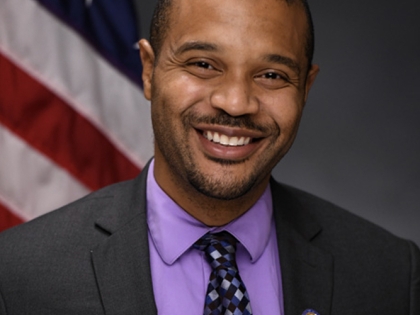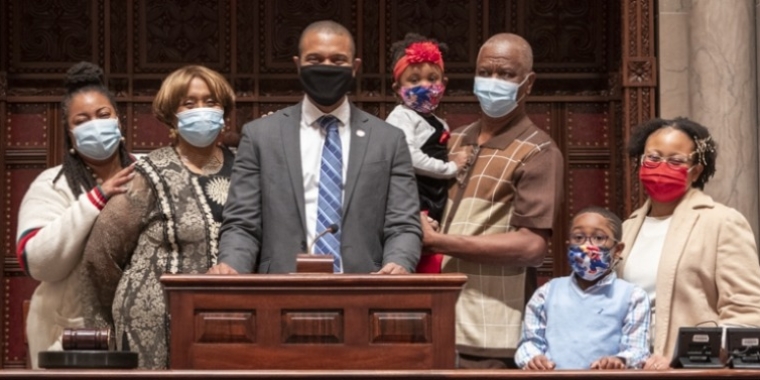
About Jabari Brisport
Chair of Committee on Children And Families
Democrat, Working Families Democrat, Working Families
District 25

Committees
- Children and Families Chair
- Aging Member
- Banks Member
- Codes Member
- Housing, Construction and Community Development Member
- Libraries Member
- New York City Education Member
English - En Español
Senator Jabari Brisport is a life-long resident of Brooklyn -- born in Bed-Stuy and raised in Prospect Heights, -- the son of an undocumented immigrant, and a proud Caribbean-American. He represents New York’s 25th State Senate district which includes Fort Greene, Boerum Hill, Red Hook, Bedford-Stuyvesant, Sunset Park, Gowanus, and Park Slope.
Senator Brisport became an activist more than a decade ago when he began organizing efforts in support of a bill to legalize same-sex marriage in New York. The bill was defeated in 2009 but he continued organizing around the issue until same-sex marriage was ultimately legalized in NY two years later. He continued his activism as part of the early Black Lives Matter movement and began organizing rallies and protests, as well as training protesters on what to do if stopped or harassed by the police.
At the time of his election, Senator Brisport was a math teacher at a middle school in Crown Heights and an active member of the United Federation of Teachers (UFT) union. As a public school teacher, he saw firsthand how the chronic underfunding of our schools and massive increases in policing have created glaring injustices for New York’s students, and how those injustices are compounded by lack of access to basic needs like housing and healthcare.
These experiences shaped his determination to fight for a just state budget that provides funding for the infrastructure and services New Yorkers need to survive and thrive, especially in times of crisis. Senator Brisport is a vocal advocate of raising taxes on the rich, and policies that place the needs of working-class people above corporate profits, including a Green New Deal, the New York Health Act, universal access to housing, and the cancelation of rent and mortgage arrears accumulated during the COVID-19 pandemic.
En Español
El Senador Jabari Brisport es residente de toda la vida de Brooklyn -- nacido en Bed-Stuy y criado en Prospect Heights -- hijo de un inmigrante indocumentado y orgullosamente Caribeño-Americano. Representa al Distrito 25 del Senado Estatal de Nueva York, que incluye Fort Greene, Boerum Hill, Red Hook, Bedford-Stuyvesant, Sunset Park, Gowanus y Park Slope.
El Senador Brisport se volvió activista hace más de una década cuando comenzó a organizar en apoyo a un proyecto de ley (un bill) para legalizar el matrimonio entre personas del mismo sexo en Nueva York. El bill fue rechazado en 2009, pero él continuó organizando por esa causa hasta que, dos años después, el matrimonio entre personas del mismo sexo finalmente se legalizó en Nueva York. Continuó su activismo como parte del movimiento Black Lives Matter y comenzó a organizar mítines y protestas, y a capacitar a los manifestantes sobre qué hacer si la policía los detenía o los acosaba.
En el momento de su elección, el Senador Brisport era profesor de matemáticas en una escuela secundaria en Crown Heights y miembro activo del sindicato United Federation of Teachers (UFT). Como maestro de escuela pública, vio de primera mano cómo la falta de inversion en nuestras escuelas y los aumentos masivos en la vigilancia policiaca han creado injusticias evidentes para los estudiantes de Nueva York, y cómo esas injusticias se ven agravadas por la falta de acceso a las necesidades básicas como vivienda y atención médica.
Estas experiencias dieron forma a su determinación de luchar por un presupuesto estatal justo que proporcione fondos para la infraestructura y los servicios que los neoyorquinos necesitan para sobrevivir y prosperar, especialmente en tiempos de crisis. El Senador Brisport es un firme defensor de aumentar los impuestos a los ricos y las políticas que colocan las necesidades de la clase trabajadora por encima de las ganancias corporativas, incluido un Green New Deal, la la New York Health Act, el acceso universal a la vivienda y la cancelación de las rentas y atrasos hipotecarios acumulados durante la pandemia de COVID-19.